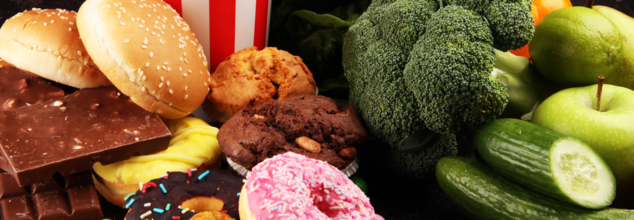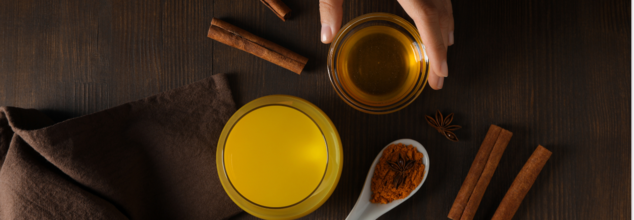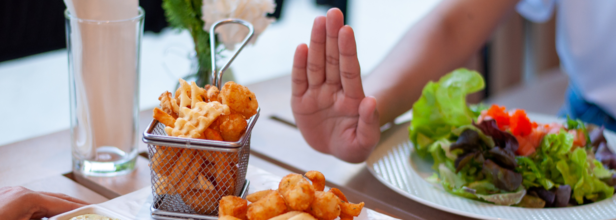
(Credit-Canva)
Don’t Judge A Book By Its Cover – These Foods Are Healthier Than You May Think
Food perceptions can often be misleading, you may be led to believe that certain things are healthy when they are not and vice versa. When you are paying more attention to your food choices and changing your lifestyle habits, you are forced to introspect on your previous habits, foods and activities.
This introspection allows you to cut out the unhealthy lifestyle activities and helps you move along your health journey. One of the biggest changes you make are in your diet, many times people remove all the things that seem unhealthy. But removing a huge chunk of your diet can cause the negative issues.
There are many foods that seem like they are unhealthy because they contain ingredients high in fat and carbs, but they are actually necessary for your diet. If you are going by the understanding that anything flavorful is bad for your diet, then you are sorely mistaken, not all healthy foods are tasteless and uninteresting. Some of the fast food favorites are also not as unhealthy as you may think! Here are some foods you should know about.
Important Considerations Before Making Big Changes To Your Diet
The key to a successful dietary change is moderation and making gradual, sustainable adjustments. By incorporating healthier alternatives and focusing on a balanced diet, you can enjoy your favorite foods while improving your overall health.
Dips and Appetizers
Guacamole, rich in heart-healthy monounsaturated fats, folate, fiber, and various vitamins, can be a nutritious snack. Prepare it yourself with fresh ingredients to control sodium and preservatives.
Eggs
Eggs are good for your heart and give you protein and vitamins; egg casseroles with vegetables are a healthy meal. Pancakes can be healthy with whole grains, fruit, and nuts. Banana and oat flour pancakes are another great choice.
Italian Dishes
Italian dishes like spaghetti and meatballs can be healthy. Use lean chicken cuts or turkey, whole wheat pasta, and monitor sodium intake. Tomato sauce provides lycopene, lean beef offers iron and protein, and pasta provides carbohydrates
Burritos and Burgers
Burritos with beans, lean meat, and veggies in whole wheat tortillas are a balanced meal. Burgers with lean meat and added veggies are healthy; choose whole wheat buns or lettuce wraps and avoid extra cheese and sauces.
Potatoes
Potatoes have vitamins and fiber; bake or steam them and top with veggies and yogurt. Sweet potatoes are also a great option. Potato salad is lighter with low-fat mayo or a vinegar dressing.
Butters (Peanut and Dairy)
Peanut butter gives you healthy fats and protein; choose versions without added salt or sugar. Butter from grass-fed cows can be part of a healthy diet, helping with vitamins and body composition.
Dark Meat Chicken
Dark meat chicken, without the skin, has healthy fats, iron, and B vitamins; avoid frying it or adding sugary sauces. It is a very good alternative to white meat.
Chocolate
Dark chocolate, in small amounts, can boost your mood and provide antioxidants and minerals. It can be a healthy treat when eaten in moderation, so enjoy a small piece.

Image Credit: Canva
Do Health Shots Really Boost Immunity? Expert Breaks It Down
As far back as I can recall, people have been searching for ways to strengthen their immune systems—either through food, vitamins, or changes in lifestyle. As scientists continue to investigate how practical it is to "boost" immunity, all that has not prevented an increasing number of products from flooding the health and wellness industry. One of them is health shots, or immunity shots, which purport to give a strong dose of immune-boosting nutrients in a small, concentrated liquid.
Do wellness shots work, or are they another health trend? We spoke to Dr. Ravi Kesari, General Medicine Expert, to deconstruct the science behind these shots and if they actually do assist in strengthening your immune defenses.
What Are Health Shots?
Health shots have become popular as a quick-fix to boost immunity, especially during cold and flu season. Unlike injectables, these are tiny, liquid shots—found at grocery stores and juice bars—that usually comprise a combination of vitamins, minerals, and plant extracts.
In accordance with Dr. Kesari, the shots are made with ingredients that have immune-boosting properties, including:
Vitamin C – A widely recognized antioxidant that aids immune function.
Zinc – Required for immune response, but excess can lead to digestive problems.
Turmeric & Ginger – Recognized for anti-inflammatory effects.
Echinacea & Elderberry – Well-known herbal supplements supposed to alleviate symptoms of cold.
Apple Cider Vinegar – Frequently added due to its supposed health benefits in digestion.
Even though these compounds sound healthy, Dr. Kesari cautions that their potency depends on the dose, bioavailability, and the person's health.
Do Health Shots Work?
The immune system is a balancing act that takes advantage of strength over sudden "boosts." Although some vitamins—such as vitamins C and D, and zinc—play a part in immune function, taking them beyond a certain dose doesn't provide additional immunity.
Dr. Kesari clarifies, "Your body absorbs only what it needs. Overloading on vitamins does not strengthen your immune system—it merely results in waste or, in some instances, bad side effects."
For example, although vitamin C is crucial to immune function, megadoses won't stop infections. Also, although zinc is valuable in fighting colds, excessive intake may bring about nausea or even kidney stones.
Common Ingredients in Immunity Shots
Let's take a closer look at the most common ingredients in wellness shots and what science actually has to say about them:
Vitamin C & Zinc
Both of these nutrients have clearly defined immune roles, but beyond a certain point, more of them is not better. Indeed, too much could cause digestive upset or toxicity.
Echinacea & Elderberry
These natural ingredients are usually sold as shortening colds. According to some studies, they can provide some benefits but no concrete scientific evidence that they can prevent or cure infections significantly.
Ginger & Turmeric
The two spices contain anti-inflammatory properties and can potentially reduce inflammation in the body. They don't have any significant effect on immunity.
Apple Cider Vinegar
Apple cider vinegar is commonly found in wellness shots for its health benefits to the gut. Although it can benefit digestion, too much consumption can lead to the wear of tooth enamel as well as irritation of the stomach.
Are There Any Risks to Taking Health Shots?
Though wellness shots can be harmless, excessive consumption of some nutrients poses health risks. Dr. Kesari points out the following risks:
Vitamin & Mineral Overload – Excess amounts of vitamin C, zinc, or other vitamins and minerals may lead to toxicity, which causes digestive upset, kidney damage, or nerve impairment.
Medication Interactions – Certain herbal ingredients, such as Echinacea, can interfere with blood thinners or other drugs.
Gastrointestinal Problems – Large doses of apple cider vinegar can result in acid reflux, nausea, and enamel damage.
Dr. Kesari emphasizes, "Health shots should complement a balanced diet but should not be used as a substitute for whole foods or medical treatments."
Health Shots vs. Vaccination: Understanding the Difference
One of the biggest misconceptions is that health shots can replace vaccines. While wellness shots may offer nutritional benefits, they do not protect against infectious diseases the way vaccines do.
Dr. Kesari explains, "Vaccines are scientifically proven to prevent certain infections by building the body's immune system. Health shots, however, give temporary bursts of nutrients but do not offer immunity against viruses such as the flu or COVID-19."
Are Health Shots Worth It?
So, are you taking immunity shots? The response is determined by your overall diet and lifestyle. If you already eat a variety of nutrient-dense foods, you probably don't need them. But if you have trouble getting sufficient vitamins and antioxidants in your diet, an occasional wellness shot can be helpful.
What Really Supports a Healthy Immune System?
Rather than turning to quick fixes, Dr. Kesari suggests:
- Consuming a balanced diet rich in fruits, vegetables, and lean proteins.
- Having adequate rest, since deprivation of sleep undermines the immune system.
- Doing regular exercises to keep immune cells active.
- Remaining hydrated to facilitate optimal functioning of bodily processes.
- Managing stress, as chronic stress lowers immunity.
Health shots can be a handy supplement to your diet, but should never substitute for a balanced regimen of immunity. They are no magic bullet and may only confer short-term advantages. The key to immune support still lies with a healthy way of life, vaccines, and routine medical screenings.
If you are thinking of adding wellness shots to your regimen, speak with your physician, particularly if you have existing health issues or are on medication.
Dr Ravi Kesari is MBBS, MD- General Medicine at Apollo Spectra Hospital, Bangalore in India

Credits: Canva
Mexico Bans Junk Food In Schools To Combat Child Obesity Problem
In Mexico, a government-sponsored junk ban in schools have taken place. It has been in effect from Saturday. The officials have also confirmed that this step is a way to tackle the problem of obesity and diabetes epidemic that the country is facing.
The health guidelines had been published last fall which took a direct shot in salty and sweet processed products. These products have become a staple for generations of Mexican school children. These include sugary fruit drinks, packaged chips, artificial pork rinds, and soy encased, chilli-flavored peanuts.
Mexico's Education Ministry posted on X, announcing that the ban had become a law. The tweet read: "Farewell, junk food!" The aim of this step is also to encourage parents to support the government's crusade by cooking healthy meals for their kids.
Mario Delgado, who is the public health secretary said, "one of the core principles of the new Mexican school system is healthy living. There is a high level of acceptance of this policy among parents."
Obesity In Mexico
As per the Global Obesity Observatory, there has been a rise in child obesity among the age bracket of 12 to 19 years. The report tracked the children between 2012 to 2021. As per a study published in Frontiers in Public Health, titled Childhood obesity in Mexico: Influencing factors and prevention strategies, overweight and obesity in school-age children, in Mexico is rapidly increasing public health problem within recent years. The study also found that obesity rates have a relation with food consumption, as there is an increase in consumption of high energy density food and drinks, whereas lower consumption of fibers.
Have Governments Gotten Involved In Foods Before?
UK has launched a new Food Strategy Advisory Board (FSAB) to improve food security, public health, and sustainability. It has brought government ministers, industry leaders and experts from the food sector together to develop policies to ensure a more resilient and healthier food system.
The FSAB is chaired by Daniel Zeichner MP, who is the minister of state for food security and rural affairs. It also includes other key figures like Professor Chris Whitty from the Department of Health and Social Care, Simon Roberts from Sainsbury’s, Anna Taylor from the Food Foundation, and Tim Smith from Cranswick. These representatives are leading food manufacturers, retailers, and research institutions, which will eventually contribute their expertise to shape a comprehensive food strategy. The aim is to balance nutrition, sustainability, and industry needs.
In the US too, the government through agencies like the US Department of Agriculture (USDA) and Centers for Disease Control and Prevention (CDC) promotes healthy eating plans. There are also resources like the Dietary Guidelines for Americans, 2020-2025 and the MyPlate.gov, which emphasizes on a balanced diet rich in fruits, vegetables, whole grains, and lean protein while limited saturated and trans fats, sodium, and added sugars.
The Dietary Guidelines for Americans is also updated every 5 years, which provides evidence-based guidance on healthy eating patterns, including Healthy US-style Eating Pattern, and Healthy Mediterranean-style Eating Pattern.

Image Credits: Canva
Three 'Simple Drink Swaps' Are Your Natural Prescription For A Sharp Memory
Your daily coffee, your Saturday cocktail, or your afternoon soda may be doing more than satisfying your thirst—they may be silently damaging your brain. One of the world's leading neuroscientists with expertise in Alzheimer's prevention, Dr. Robert Love, advises that the beverage you choose can have a powerful effect on your memory, mental acuity, and brain health over the long term.
In a recent Instagram video, which has reached millions, Love named three popular beverages that can speed up brain decline and put you at risk of dementia. But it's not all doom and gloom—he also shared easy, healthier substitutes that can feed your brain and shield your memory for decades to come.
If you want to keep your mind sharp, it's time to think twice about what's in your cup.
Why What You Drink Matters for Memory?
Brain health is not only about what you consume—what you drink matters just as much. Some drinks can heighten inflammation, upset gut health, and lead to neurodegeneration in the long run. Research has revealed that chronic inflammation and insulin resistance are major causes of cognitive impairment, and hence dietary habits become crucial in the prevention of memory-related diseases such as Alzheimer's.
Dr. Love identifies three beverages that ruin memory and speed brain ageing—and provides simple switches with long-term mental advantages.
Drink #1: Alcohol
Alcohol is arguably controversial in terms of its health impact, but science is becoming more definite: it's unhealthy for your brain.
"Alcohol is neurotoxic—it damages and kills neurons," says Love. "It also disrupts gut bacteria, and what’s good for your gut is good for your brain. By harming your gut bacteria, you’re also harming your brain."
Beyond its immediate effects on cognitive function, alcohol contributes to chronic inflammation, liver stress, and poor sleep—all of which are linked to impaired memory and increased dementia risk.
According to Love, beer is particularly harmful to brain health due to its gluten content and its ability to raise uric acid levels.
"Gluten is inflammatory, and beer also increases uric acid, which promotes belly fat storage," he explains. "Ever heard of a beer belly? That’s uric acid at work."
If you do still intend to drink alcohol on occasion, Love suggests opting for good-quality tequila with a squeeze of fresh lime. "It's one of the cleaner options and will probably do less damage than beer," he points out. The best option for your brain, though, is to reduce or eliminate alcohol consumption altogether.
Drink #2: Soda
Soda is a notorious weight-gain and metabolic-disorder culprit, but its effects on brain health are no less alarming.
"Soda is filled with sugar and has no fibre, so it spikes your blood sugar and insulin levels very quickly," says Love. "This causes inflammation, and inflammation is one of the largest risk factors for Alzheimer's disease."
Consuming high amounts of sugar has also been associated with cognitive decline, memory loss, and elevated risks of neurodegenerative disorders. Research also indicates that regular consumption of soda can decrease the size of the hippocampus—the memory center of the brain—over time.
Rather than grabbing for a can of soda, grab sparkling water with a splash of lemon for a cool, brain-smart option. If you must have caffeine, green tea gives you robust antioxidants that maintain cognitive function and fight inflammation.
Drink #3: Giant Frappuccinos
That gigantic, sugar-ridden frappuccino at your favorite coffee house may be providing you with more than just a shot of energy—it could be silently destroying your brain.
"These beverages have too much caffeine—usually 300 to 400 milligrams—and are full of sugar," cautions Love. "That's not only terrible for your heart and blood vessels; it's terrible for your brain, as well."
Too much caffeine overstimulates the nervous system, causing heightened anxiety, sleep disruptions, and even cognitive impairment with prolonged use. High sugar content, on the other hand, leads to inflammation, insulin resistance, and compromised brain function.
If you're an every-day-coffee fan, opt for matcha or black coffee. They're both rich in brain-fueling antioxidants, but it is important to ensure that they're organic.
"Regular coffee is often filled with pesticides, and those are detrimental to brain function," Love adds. Organic matcha and black coffee offer a cognitive boost with no toxic load.
What are Some Brain-Boosting Habits?
While replacing dangerous beverages with more healthful ones is a fine start, the overall lifestyle decisions count as well. Here are some other steps to help keep your memory and brain sharp:
- Drink plenty of water. Cognition can be affected by dehydration, so be sure to get plenty of fluids during the course of the day.
- Consume a brain-healthy diet. Emphasize whole foods with antioxidants, healthy fats, and fibre to support both your brain and gut.
- Prioritize sleep. Lack of sleep is connected to memory loss and brain degradation. Strive for seven to nine hours of good-quality rest per night.
- Exercise your body. Exercise can help brain function by increasing blood flow and eliminating inflammation.
Brain health has nothing to do with genetics and everything to do with the everyday choices you make. No beverage is going to completely ruin your cognitive abilities tomorrow, but continually drinking toxic substances will catch up with you.
© 2024 Bennett, Coleman & Company Limited

